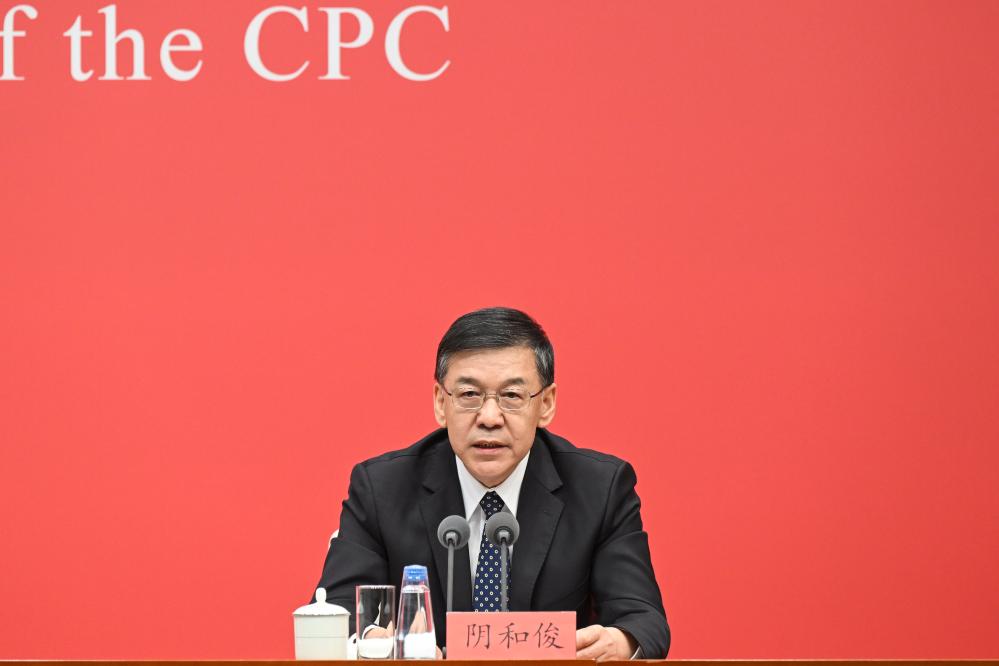China Focus: Chinese sci-tech minister outlines innovation plans for 2026-2030 period
Source: Xinhua
Editor: huaxia
2025-10-24 20:46:00

Chinese Minister of Science and Technology Yin Hejun speaks at a press conference held by the Communist Party of China (CPC) Central Committee on the guiding principles from the fourth plenary session of the 20th CPC Central Committee on Oct. 24, 2025. (Xinhua/Jin Liangkuai)
BEIJING, Oct. 24 (Xinhua) -- The Recommendations of the Central Committee of the Communist Party of China (CPC) for Formulating the 15th Five-Year Plan for Economic and Social Development has outlined four arrangements regarding sci-tech innovation from 2026 to 2030, Minister of Science and Technology Yin Hejun said Friday.
These arrangements are aimed at accelerating high-level sci-tech self-reliance and guiding the development of new quality productive forces, Yin told a press conference.
The arrangements include strengthening original innovation and breakthroughs in core technologies, promoting deep integration between scientific and industrial innovation, advancing the coordinated development of education, sci-tech and talent, and further boosting the construction of the Digital China initiative.
Yin pointed out that it is essential to strengthen original innovation and make breakthroughs in core technologies in key fields.
He stressed the importance of improving the new system for mobilizing resources nationwide and called for decisive breakthroughs in core technologies across the entire chain. This effort will focus on key areas such as integrated circuits, industrial machinery, and high-end instruments.
He added that it is important to strengthen strategic, forward-looking, and systematic layouts in basic research and increase long-term, stable support.
When it comes to deepening the integration of technological innovation and industrial innovation, he emphasized the need to accelerate the efficient transformation and application of major scientific and technological achievements and enhance the protection of intellectual property rights.
He highlighted the importance of reinforcing the role of enterprises as key players in technological innovation. It is essential to support the development of high-tech enterprises and small and medium-sized sci-tech firms, and increase the super-deduction ratio of corporate R&D expenses, he said.
Yin noted that China will build an open, shared, and secure national integrated data market, and promote the in-depth integration of the real economy and the digital economy. It will accelerate innovation in digital intelligence technologies such as artificial intelligence (AI) and enhance the efficient supply of computing power, algorithms, and data.
The Chinese government attaches great importance to AI and has been fostering a favorable innovation ecosystem. A number of internationally influential innovations have been achieved in areas such as foundational models and humanoid robots.
By the end of 2024, the number of AI enterprises in China surpassed 4,500, reflecting the ongoing expansion of the industry. "AI Plus" has penetrated key industries such as manufacturing, finance, and healthcare, forming a new engine for economic growth.
Yin said that in the next step, China will earnestly implement the requirements of the "Proposals" and continue to strengthen the top-level design and systematic deployment of AI in the 15th Five-Year Plan period.
"We will continue to enhance basic research and make breakthroughs in core technologies in key fields, focusing on developing new model algorithms and high-end AI chips," he said.
He also noted that China will continue to advance the "AI Plus" initiative, aiming to promote the deep integration of artificial intelligence with technological innovation, industrial development, upgraded consumption, and protections for people's livelihoods.
He also stressed the need to improve relevant laws and regulations, policies, application standards, and ethical guidelines, and continuously refine the governance mechanism. At the same time, it is also important to promote international exchanges and cooperation, making AI a global public good that benefits humanity. "We will work together to build a global AI governance system and jointly address global challenges," he said.
He emphasized the need to bolster the development of a modern industrial system. Efforts will be directed toward nurturing and bolstering a group of emerging industries in areas such as new-generation information technology and artificial intelligence, while also pioneering future industries in fields like quantum technology and biotechnology. Additionally, digital and intelligent technologies should be actively applied to transform and upgrade traditional industries, driving industrial transformation toward intelligent, green, and integrated development.
He also called for developing new quality productive forces based on local conditions. This involves strengthening macro-level guidance and coordinated planning for local scientific innovation and industrial layout, guiding regions to leverage their unique strengths and resources to build competitive edges in technology and distinctive industries, thereby pursuing differentiated development paths.
During the 14th Five-Year Plan period, China achieved fruitful results in scientific and technological innovation. In 2024, the total national R&D expenditure exceeded 3.6 trillion yuan (about 507.6 billion U.S. dollars), an increase of 48 percent compared to 2020. The number of high-level international journal publications and international patent applications ranked first in the world for five consecutive years. The country's comprehensive innovation capability ranking rose from 14th in 2020 to 10th in 2024.
The integration of scientific and technological innovation with industrial innovation has accelerated, with the value added by high-tech manufacturing industries above the designated size increasing by 42 percent compared to the end of the 13th Five-Year Plan period. Frontier fields such as artificial intelligence, new energy, and biotechnology are becoming new growth drivers for the economy.
The 20th CPC Central Committee convened its fourth plenary session in Beijing from Monday to Thursday. Participants at the session deliberated over and adopted the Recommendations of the CPC Central Committee for Formulating the 15th Five-Year Plan for Economic and Social Development, according to a communique of the session released on Thursday. ■



